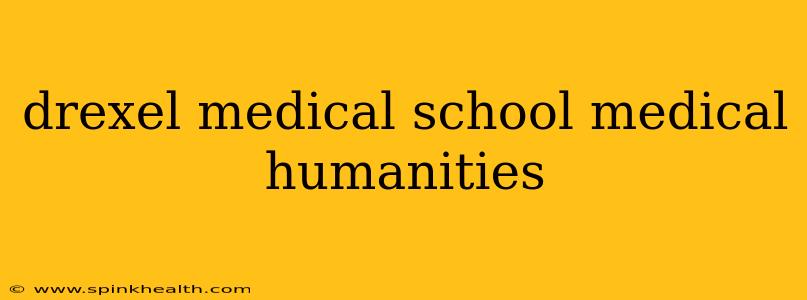The rhythmic thump-thump-thump of a heart, the quiet observation of a patient's subtle gestures, the weight of a life held in your hands – these aren't just elements of medical practice; they are the very essence of the human experience. At Drexel University College of Medicine, they understand this profoundly. Their commitment to Medical Humanities isn't just a program; it's woven into the fabric of their medical education, creating a unique learning environment that fosters not just skilled physicians, but compassionate healers.
My journey into understanding Drexel's approach to Medical Humanities began with a simple question: How does a program like this impact the future of medicine? The answer, I quickly discovered, is far more nuanced and deeply rewarding than I initially anticipated.
What is the Medical Humanities Program at Drexel?
Drexel's Medical Humanities program isn't a standalone elective; it's an integral part of the curriculum, enriching the core scientific education with a profound exploration of the ethical, social, and historical contexts of medicine. This integrated approach ensures students aren't just learning about diseases and treatments, but also the human stories behind them. They learn to view patients not just as diagnoses, but as individuals with complex lives, beliefs, and values.
This is achieved through a variety of methods, including:
- Required courses: These courses delve into topics like medical ethics, history of medicine, bioethics, and the arts in medicine.
- Workshops and seminars: These offer deeper explorations of specific issues and provide opportunities for interactive learning and discussions.
- Community engagement: Students participate in community health initiatives, allowing them to engage with diverse populations and develop a deeper understanding of the social determinants of health.
- Opportunities for creative expression: Students are encouraged to explore creative avenues like writing, art, and music to process their experiences and develop empathy.
What are the benefits of Drexel’s Medical Humanities program?
The benefits extend far beyond a stronger application. It cultivates a more holistic approach to medical practice. Graduates are better equipped to:
- Communicate effectively with patients: Understanding the patient's perspective and concerns is crucial for effective healthcare. The Medical Humanities curriculum enhances communication skills, leading to stronger patient-physician relationships.
- Make ethical decisions: Navigating complex ethical dilemmas is a constant in medicine. The program provides students with the frameworks and critical thinking skills to make informed and compassionate decisions.
- Practice culturally sensitive medicine: Understanding diverse cultural backgrounds and beliefs is essential for providing equitable and respectful care. Drexel's program fosters cultural sensitivity and awareness.
- Develop resilience and empathy: The emotional toll of medicine can be significant. The humanistic approach provides students with tools to cope with stress and maintain empathy throughout their careers.
How does the Medical Humanities program at Drexel differ from others?
Drexel’s program distinguishes itself through its deep integration within the curriculum. It's not an add-on but a fundamental aspect of becoming a physician. This embedded approach ensures that humanistic considerations are not an afterthought, but a cornerstone of medical education.
Does Drexel's Medical Humanities program prepare students for the realities of medical practice?
Absolutely. By addressing the emotional, ethical, and social dimensions of medicine, the program prepares students for the complex and often challenging realities of their future careers. It fosters a resilience and a sense of purpose that extends beyond technical skills.
What are some examples of courses or activities within the program?
While specific course offerings may vary, expect a rich tapestry of learning experiences. Past examples include courses examining the history of public health, analyzing ethical dilemmas in end-of-life care, and exploring the intersection of art and medicine through creative writing workshops or visual art projects.
How can I learn more about applying to Drexel's Medical School?
The best place to start is the official Drexel University College of Medicine website. You'll find details on admissions requirements, curriculum specifics, and further information about their comprehensive and deeply human-centered approach to medical education. Their website also frequently highlights success stories and showcases the vibrant community within the college.
In conclusion, Drexel University College of Medicine's commitment to Medical Humanities is not simply a trend; it’s a visionary approach that's shaping the future of compassionate and effective healthcare. It's a testament to their understanding that the best physicians are not just skilled scientists, but also empathetic human beings.

